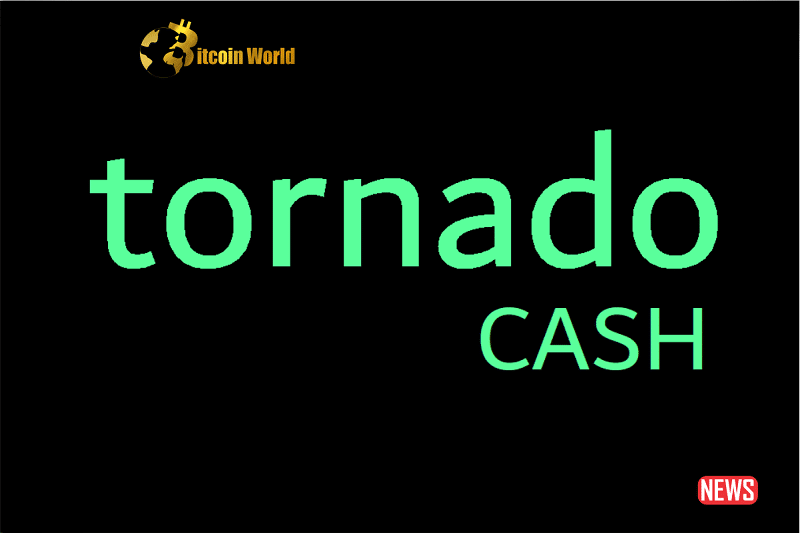The world of cryptocurrency is no stranger to regulatory scrutiny, and the recent decision regarding Tornado Cash is a prime example. You might be wondering what’s been happening with this cryptocurrency mixer and why it’s making headlines. Well, buckle up, because a US federal court has just upheld sanctions against it, denying an appeal to ease restrictions. Let’s break down what this means and why it’s important.
The Court’s Verdict: Tornado Cash is an ‘Association’
In a nutshell, US District Judge Robert Pitman has ruled that the sanctions imposed on Tornado Cash are appropriate. According to the court document filed on August 18th, the court believes “Tornado Cash is an association within the ordinary meaning of the term and, as such, is an entity that may be designated pursuant to OFAC regulations.” This ruling came after six individuals requested the court to ease the restrictions, but their plea was ultimately denied.
Why Were Sanctions Imposed in the First Place?
The US government, through the Office of Foreign Assets Control (OFAC), initially placed tight regulations on Tornado Cash back in August 2022, adding it to the Specially Designated Nationals and Blocked Persons (SDN) List. This action stemmed from concerns about the platform’s alleged role in facilitating money laundering. OFAC stated that Tornado Cash had been involved in processing a staggering $7 billion in illicit transactions since 2019.
A significant point of contention was the alleged use of Tornado Cash by the Lazarus Group, a North Korean hacking collective, to launder approximately $455 million in stolen funds. This included funds from the 2022 attack on the Horizon Bridge.
What Exactly is Tornado Cash? The Heart of the Dispute
Here’s where things get a bit technical, and it’s the core of the disagreement. The six individuals who filed the appeal argue that Tornado Cash isn’t a traditional organization. They describe it as:
- A collection of smart contracts.
- Operating on the Ethereum blockchain.
- Decentralized and open-source software.
Essentially, they argue it’s a tool, not an entity with a central authority. Think of it like email – the technology itself isn’t inherently illegal, even if it can be used for illicit purposes. The plaintiffs emphasize that the sanctions shouldn’t target the underlying technology but rather the individuals misusing it. They specifically exclude “individual founders, developers, members of the DAO, or users” from their definition of Tornado Cash as an organization.
On the other hand, OFAC views Tornado Cash as an “entity operating a cryptocurrency mixing service.” This difference in definition is crucial because if Tornado Cash were recognized as autonomous software, it might be exempt from SDN restrictions.
The Arguments Against the Sanctions: Free Speech and Overreach?
The plaintiffs raised some significant legal points in their appeal, arguing that the sanctions:
- **Exceed the Department’s purview:** They believe the decision to sanction goes beyond the legal authority granted to OFAC.
- **Violate the Free Speech Clause:** They argue that the sanctions restrict their ability to use open-source software for legitimate purposes, thus infringing on their right to free speech.
- **Target immutable, autonomous smart contracts:** They emphasize that the core of Tornado Cash relies on self-executing code that cannot be altered, raising questions about the fairness of sanctioning such technology.
The Implications of the Court’s Decision: What Does This Mean?
The court’s decision to uphold the sanctions has several important implications:
- **Sets a Precedent:** This ruling could influence future regulatory actions against decentralized technologies and crypto mixers.
- **Impacts Privacy:** For users who rely on mixers like Tornado Cash for legitimate privacy reasons, this decision limits their options.
- **Raises Questions about Decentralization:** The case highlights the ongoing debate about how to regulate decentralized technologies that don’t have traditional organizational structures.
- **Potential for Further Appeals:** While this appeal was denied, it’s possible that the plaintiffs will pursue further legal avenues.
Looking Ahead: The Future of Crypto Mixers and Regulation
The Tornado Cash saga is far from over. This case underscores the complex challenges of regulating the cryptocurrency space, particularly when it comes to balancing innovation, privacy, and the need to combat illicit activities. The debate about whether code is speech and the extent to which decentralized technologies can be regulated will likely continue to be a central theme in the evolving landscape of crypto regulation.
For now, the sanctions against Tornado Cash remain in place, serving as a stark reminder of the regulatory scrutiny facing the crypto industry. It will be interesting to see how this case develops and what impact it has on the future of privacy-focused cryptocurrency tools.
Disclaimer: The information provided is not trading advice, Bitcoinworld.co.in holds no liability for any investments made based on the information provided on this page. We strongly recommend independent research and/or consultation with a qualified professional before making any investment decisions.




